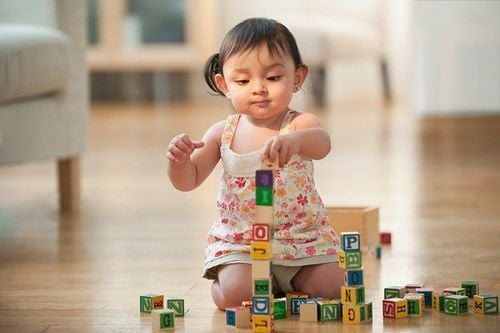This is an automatically translated article.
Taking care of a baby at the age of 30 months is quite difficult but equally interesting. Your little angel is officially two and a half years old. The average weight of a 30-month-old baby is about 12.7 kg for girls and 13.6 kg for boys. However, depending on the nutritional care conditions for the baby, many parents still do not know how much weight a 30-month-old child is enough? Read the article below to understand how much a 30-month-old baby weighs.
1. Why is the child's weight important?
Your baby's weight is considered to be one of the important factors providing information to your doctor to help them determine if your baby is growing as expected or there may be potential concerns. some hidden.
Children find it difficult to gain weight for many reasons:
Children do not get enough energy or calories are high Children have medical problems such as congenital heart disease or gastrointestinal diseases such as gastroesophageal reflux disease manage . Children with problems with birth defects such as cleft lip and cleft palate Children exposed to infections before birth. When a child is not gaining weight normally, it could be a warning sign of problems like malnutrition or some other underlying health problem.
Not being able to gain weight is also a worrying condition because it greatly affects a child's ability to reach developmental milestones. At the same time, it also adversely affects their immune system.
The most important thing is to help children gain reasonable weight and maintain appropriate nutrition. Doing so can help children maintain a normal weight later in life.
As parents, we need to make sure our 2.5 year old children get the right amount of nutrition they need. Children cannot control what they eat. That is why it is our duty as parents to lay the foundation for a happy and healthy lifestyle in the future, by providing children with the right nutrition
If you are concerned If your baby is underweight or overweight, talk to your pediatrician. They will let you know your child's growth rate and, if necessary, work with you to develop a nutritional treatment plan that's right for you.
2. Some important milestones for a 30-month-old baby
Children can run, jump, go up and down stairs quite proficiently, kick and throw balls Children begin to grow molars Children's vocabulary is from 100 - 250 words. Your child may also use two- or three-word phrases. Children can put on or take off their own clothes and socks Some tantrums are possible at this point. Children may be nervous or shy when meeting strangers. Children eat raw well

Ăn thô tốt ảnh hưởng tới cân nặng của trẻ 30 tháng tuổi
3. Weight of 30-month-old children.
Newborns are born with different weights and indicators. A baby's weight will vary significantly by many different factors. For a full-term newborn, the average birth weight at birth is 2.4 - 4.2 kg for girls and 2.5 - 4.4 kg for boys. Over time, as a child grows, his or her weight gain rate is an important indicator of the overall health and development of a healthy baby.
Important weight readings (in kg) for 30-month-old babies according to the World Health Organization (WHO).

Alternatively, you can use the CDC BMI formula (Body Mass Index is a tool used by health professionals to calculate if a person's weight is within a healthy threshold It can be used for children and adults). However, BMI is not a perfect tool to see if your 2.5 year old's weight is healthy, but it is much better than just looking up your child's average weight. . It is also the most common formula used by doctors worldwide to calculate if your child is underweight/overweight.
Its main problem is that it doesn't take into account the weight difference between muscle and fat.
Muscle is much thicker than fat, so it weighs more. This means that BMI does not discriminate between children with more muscle than children with more fat.
Apparently, kids with a higher muscle to fat ratio are considered healthier. But BMI cannot effectively show the difference between the two.
4. Factors affecting children's weight
4.1. Genetic factors A child is born with all the genetic characteristics of both parents. Scientists have shown that genetic factors have a great impact on the development and size of organs in the child's body. Blood type, excess body fat and weight of both father and mother. Mothers also play an important role in the physical development of children.
4.2. Nutrition and living environment According to a study published by the United Nations University in Tokyo - Japan, external environmental factors such as nutrition are extremely important for the physical development of children. young. For example, malnutrition will slow down the development of children. It affects bone density, the strength of teeth, and the size of organs in the body. And more seriously, it also delays the child's ability to develop during puberty and pre-puberty. A child with adequate nutrition will catch up the necessary growth momentum. Therefore, parents need to provide enough essential nutrients for children in each stage. Besides, environmental factors such as polluted climate also make children grow slowly.

Bé 30 tháng cân nặng bao nhiêu còn phụ thuộc vào nhiều yếu tố khác nhau như dinh dưỡng
According to a study in the Journal of the American National Medical Association in January 2020, children with a history of sickle cell anemia in the developmental period from 8 to 19 years old often have small in stature, much lighter in weight than other healthy children of the same age. At the same time, the physiological development or reproductive health of children at this stage is also disturbed or delayed.
4.4. Child's gender Boys tend to weigh more and gain weight faster than girls
4.5. Some other factors - Mother's health, weight, nutritional status and living habits during pregnancy.
- Medicines
- Hormones...
Baby's weight is one of the important indicators to help you and your baby's doctor monitor your baby's development. Gaining weight too slowly or too quickly will have long-term health consequences if not self-corrected. A 30-month-old baby is considered normal weight when they are between the upper and lower limits of the Weight-for-Age Index. As a parent, you should try to care for and create the most favorable conditions so that the child can achieve and keep the most appropriate weight, creating a premise for later development.
In addition, 30-month-old children need 5mg of elemental zinc/day to eat well, reach the correct height and weight and exceed the standard. Zinc plays a role in affecting most biological processes taking place in the body, especially the breakdown of nucleic acids, proteins... Organs in the body when zinc deficiency can lead to a There are a number of diseases such as neurological disorders, irritability, etc. Therefore, parents need to learn about the role of zinc and guide them to appropriate zinc supplements for their children.
In addition to zinc, parents also need to supplement their children with other important vitamins and minerals such as lysine, chromium, B vitamins,... errands.
Please regularly visit Vinmec.com website and update useful information to take care of your baby and family.













